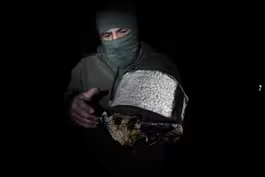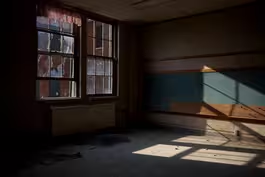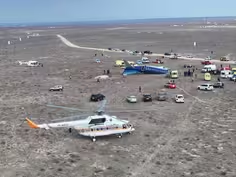
Colleges advise students to return before Trump takes office
Clip: 12/26/2024 | 8m 10sVideo has Closed Captions
Colleges advise some international students to return to U.S. before Trump takes office
Most college students are on their winter break gathering with family and friends. But some from outside the United States may return to campus early this holiday season after several universities and colleges are advising them that the incoming Trump administration may make it more difficult for them to return later. Lisa Desjardins explains.
Problems playing video? | Closed Captioning Feedback
Problems playing video? | Closed Captioning Feedback
Major corporate funding for the PBS News Hour is provided by BDO, BNSF, Consumer Cellular, American Cruise Lines, and Raymond James. Funding for the PBS NewsHour Weekend is provided by...

Colleges advise students to return before Trump takes office
Clip: 12/26/2024 | 8m 10sVideo has Closed Captions
Most college students are on their winter break gathering with family and friends. But some from outside the United States may return to campus early this holiday season after several universities and colleges are advising them that the incoming Trump administration may make it more difficult for them to return later. Lisa Desjardins explains.
Problems playing video? | Closed Captioning Feedback
How to Watch PBS News Hour
PBS News Hour is available to stream on pbs.org and the free PBS App, available on iPhone, Apple TV, Android TV, Android smartphones, Amazon Fire TV, Amazon Fire Tablet, Roku, Samsung Smart TV, and Vizio.
Providing Support for PBS.org
Learn Moreabout PBS online sponsorshipWILLIAM BRANGHAM: Most college students are on their winter break right now, gathering with family and friends at home.
But some who live outside the United States may return to campus early this holiday season after a number of U.S. universities and colleges are advising them that the incoming Trump administration may make it more difficult for them to return later.
Lisa Desjardins explains.
LISA DESJARDINS: The universities are considering two factors, that president-elect Trump campaigned on again closing the U.S. to citizens of some Muslim-majority countries and that his 2017 travel ban came during his first week, sparking a logistics nightmare for some students and faculty trying to reenter the country then.
More than a dozen universities, including Harvard, Cornell, University of Massachusetts, and the University of Southern California, are now warning students to return before January 20, that's to say, before the first week of Trump's new term.
Ted Mitchell is the president of the American Council on Education, which represents more than 1,600 colleges and universities.
TED MITCHELL, President, American Council on Education: I think that there is expectation, we share it, that there will be some kind of travel ban early in the administration, maybe as early as the first week, through executive order.
And campuses are suggesting that students return early so that they won't be wrapped up either in the travel ban specifically or in just the general chaos that we saw that happened the last time we had travel bans.
LISA DESJARDINS: For more, I'm joined by Dan Berger, immigration attorney and academic fellow at Cornell Law School.
Dan, president-elect Trump has in fact said that he is thinking of bringing back a travel ban.
He has named a few Muslim-majority countries, but, other than that, we don't have really details or anything on timing or how much of a priority this is.
But how widespread is the concern among schools?
DAN BERGER, Cornell Law School: Well, thanks, Lisa.
I think schools are nervous and international students and scholars are nervous, because, during the previous Trump administration, we were surprised sometimes at what would happen.
New policies tended to drop at 5:00 p.m. on Friday and often without a lot of notice.
So I think schools are nervous, and they're probably going to be nervous not just in the first week, but for the next few years.
LISA DESJARDINS: It's interesting.
I was at the White House during that 5:00 policy drop on that Muslim -- that first ban that President - - then-President Trump put in place.
But we have a million students from around the world who come here to be educated.
My question to you, even though a smaller portion of them are from Muslim-majority countries, is, how is this going to affect their lives either right now in thinking about a potential ban or those who may be thinking about enrolling here in the future?
DAN BERGER: So, for those students, I guess there are two things to think about.
The ones who are out of the U.S. are nervous about getting in, those who are applying or who have been accepted recently.
And then those who are here are nervous about being able to travel, whether it's for study abroad or to see their family or for research or other activities.
So it really makes it difficult.
And what we found last time was that quite a few students from Muslim-majority countries were spending their time here and not traveling.
LISA DESJARDINS: Yes, do you know of any students now who have changed their plans, either not left or are coming back early?
DAN BERGER: Yes everybody's got a different story.
I just got a question earlier today about somebody who was planning to fly in at 8:30 in the morning on January 20 and wanted to know if that was OK.
But, in general, I think people are moving their plans earlier to get here a couple of days before the inauguration just to be in the United States and see what happens and work through it all together.
LISA DESJARDINS: That's so fascinating -- 8:30 East Coast, that's just a few hours before that constitutional noon swearing-in of the new president.
Let's talk also about the wider community here.
Obviously, universities and university towns really depend on students from all around the world, as well as from their own community.
I want to play more of what Ted Mitchell told us about some of the potential effects here.
TED MITCHELL: The U.S. has about a million foreign students on our campuses a year.
And so any significant elimination of those students, reduction in those students will be reduction in the diversity of experience on our campuses, reduction in tuition revenue on our campuses.
I will say that we don't think a lot about it, but all of those million students buy shoes, go to restaurants, rent apartments.
And so it's not just the institutions and the students who are going to lose out here, but it's the communities and the retailers, et cetera, who have a lot at stake in the spending power of our international student population.
LISA DESJARDINS: Our viewers are good students as well.
They love numbers and perspective.
We have got about 18 million or 19 million university students total, one million international students.
That's clearly far from the majority of them.
But what is the concern about college towns potentially if there's an issue here?
DAN BERGER: Well, I think, as Ted said, there's an issue of the fact that students are part of the economic and social life of these towns.
And so it does -- it will affect the economies of these towns.
But, also, it affects laboratories and student newspapers and activities they're involved in.
LISA DESJARDINS: From the Trump team perspective, he has campaigned on this idea that he would like to limit travel out of a national security concern.
And we know, I know from speaking to them, that some of his voters feel that way.
They're concerned about national security as a priority.
How do you see that balance?
It's a classic debate between America as a land of opportunity for the rest of the world and the idea that, during this time where we see multiple crises around the world, America needs to worry more about its own security.
And how does that play in here?
DAN BERGER: Well, absolutely.
I mean, immigration is a balance between security and opportunity.
International students are very heavily regulated.
They do go to a U.S. consulate abroad.
The biometrics are taken.
They are screened.
They do go through security checks.
Some are delayed before they get here because of those security checks.
And then, once they're here, they are tracked by a computer tracking system that's run by ICE called SEVIS, which has been around since the-post 9/11 era.
So I -- no system is perfect, and we should look very carefully at security.
But I think there are already very significant security provisions in place.
LISA DESJARDINS: Are you saying a blanket ban is not the way to go, that maybe there should be an exception for students, or... DAN BERGER: Yes, I mean, in my own opinion, I would say that a blanket ban of people from certain countries doesn't make sense.
Having individual security checks, which is what happens now for students and doing background checks and delaying students' entry if there's a concern does make sense.
And that's been the policy for years.
LISA DESJARDINS: So, given all of this, how would you advise international students and their families right now for what's ahead?
DAN BERGER: Well, I think part of it is risk tolerance.
Some students are asking me simple questions, like, can I go visit my family next summer or can I study abroad next fall?
And I have to say there's uncertainty.
We will look and see what happens the first week, but we will also wonder what's going to happen over the next year.
And students are going to have to balance the importance of what they're doing, whether it's to visit a sick family member or to do an important bit of research for a Ph.D., versus the risk of possibly being stuck outside the country.
And different students have different risk tolerances, and these are conversations that are happening on campuses between the students and their foreign student advisers every day now.
LISA DESJARDINS: Dan Berger, thank you so much for joining us.
DAN BERGER: Thank you, Lisa.
As Arctic warms, communities face dramatic changes
Video has Closed Captions
Clip: 12/26/2024 | 3m 57s | As Arctic warms, Indigenous communities there face dramatic changes to their way of life (3m 57s)
Assad regime made billions producing, exporting party drugs
Video has Closed Captions
Clip: 12/26/2024 | 8m 31s | How the Assad regime made billions producing and exporting party drugs (8m 31s)
Claressa Shields on new film 'The Fire Inside'
Video has Closed Captions
Clip: 12/26/2024 | 7m 27s | Claressa Shields on 'The Fire Inside,' new film chronicling her journey to Olympic gold (7m 27s)
Investigation finds more deaths at Native boarding schools
Video has Closed Captions
Clip: 12/26/2024 | 6m 53s | Investigation reveals higher death toll at Native American boarding schools (6m 53s)
Russian system may have downed airliner, U.S. official says
Video has Closed Captions
Clip: 12/26/2024 | 9m 57s | Russian anti-aircraft system may have downed Azerbaijani plane, U.S. official says (9m 57s)
Providing Support for PBS.org
Learn Moreabout PBS online sponsorship
- News and Public Affairs

FRONTLINE is investigative journalism that questions, explains and changes our world.

- News and Public Affairs

Amanpour and Company features conversations with leaders and decision makers.












Support for PBS provided by:
Major corporate funding for the PBS News Hour is provided by BDO, BNSF, Consumer Cellular, American Cruise Lines, and Raymond James. Funding for the PBS NewsHour Weekend is provided by...





